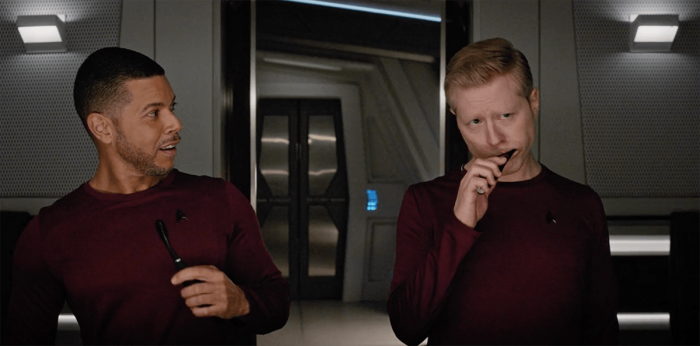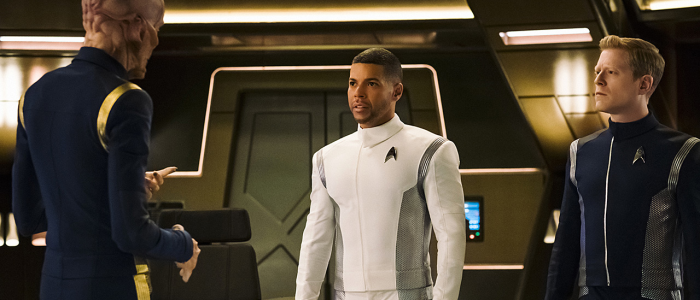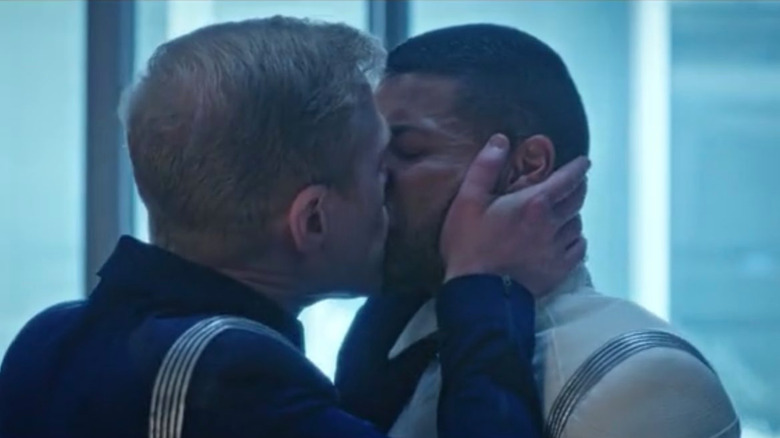'Star Trek: Discovery' Is The Antidote To The Kevin Spaceys Of The World
(Welcome to The Soapbox, the space where we get personal, political, and opinionated about anything and everything. In this edition: how Star Trek: Discovery, and series star Anthony Rapp, feel more necessary than ever following the allegations against Kevin Spacey.)
Lt. Stamets of the starship Discovery has taken on a bolder meaning in recent weeks.
The actor behind the Star Trek: Discovery character, Anthony Rapp, revealed that Kevin Spacey once tried to sexually coerce him when Rapp was just 14 years old. Learning about the act of sexual misconduct was shocking enough on its own, but what made things even more shocking was Spacey's initial statement about why he did it. To paraphrase his statement, he acted this way because he was drunk and in the closet.
It's important to note that Rapp, who is gay, is playing a gay man in a relationship on television at a time when an actor like Spacey has sought to use what is supposed to be a brave moment — coming out — as a way to deflect from his predatory relationships. This poses a threat to strides the LGBT community has made across the board towards inclusion and positive representation, and exposes people once again to the stereotypes that being LGBT is synonymous with being a sexual predator. Thankfully, it's Rapp's own presence in Star Trek: Discovery, as well as his relationship with Wilson Cruz's Dr. Culber that illustrates for viewers that whatever Spacey believes about being gay is absolutely untrue.
"That Spacey is gay has nothing to do with his alleged sexual misconduct against a minor, which the actor describes as 'inappropriate drunken behavior;' it would be unwise to conflate the two, and doing so would be like asserting anyone with a drinking problem would somehow find it appropriate to make sexual advances toward a teenager (or that homosexuality is equivalent to alcoholism in the first place)," wrote Tyler Coates for Esquire. "Spacey's misguided statement only gives fuel to anti-LGBT activists, who have long used fear-mongering tactics invoking pedophilia as ammunition against queer people, particularly gay men."
Whereas Spacey illustrates the absolute worst, Rapp and the writers of Star Trek: Discovery are attempting to show forward momentum with LGBT representation and positive LGBT relationships, momentum that had been long deferred in the Star Trek franchise. But if goes beyond simple representation. The relationship between Stamets and Wilson Cruz's Dr. Culber is not only giving LGBT viewers the inclusion they've been hoping for, but also showing general audiences what true love actually looks like.
Star Trek's Long March to Gay Characters
In a 1991 interview with The Humanist, Star Trek creator Gene Roddenberry said he had finally come to terms with homosexuality, complete with a promise to include LGBT characters in Star Trek: The Next Generation:
"My attitude toward homosexuality has changed. I came to the conclusion that I was wrong. I was never someone who hunted down [f***] as we used to call them on the street. I would sometimes, say something anti-homosexual off the top of my head because it was thought, in those days, to be funny. I never really deeply believed those comments, but I gave the impression of being thoughtless in these areas. I have, over many years, changed my attitude about gay men and women."
Roddenberry died before he could put his promise into action. Thankfully, we are finally beginning to see the promise fulfilled. Star Trek: Discovery features a same-sex relationship among two of its main characters, a first for the franchise. Stamets and Culber's relationship and their sexuality are not relegated to the sidelines or treated as something that only gets brought up on "a very special episode." They are well-respected members of the crew and there's no denying their worth to the team simply because of who they love.
As Eleanor Treemer wrote for MoviePilot, seeing Culber and Stamets calmly brush their teeth side by side and talk about the day's events was an "understatement" that "sent a clear message: This relationship is not a statement." She continued:
"Stamets and Culber brushing their teeth and discussing their day at work is not revolutionary. No song and dance was needed, no politics were attached to this soft romantic moment. These two men are in love. So what?"
Star Trek has preached a good game throughout its franchise history, but the various writing and production teams' treatment of Starfleet has often been antithetical to Star Trek's mission statement. Over the years, writers have largely avoided representation of LGBT characters and relationships despite the progressive attitudes espoused in the show's text. Said Star Trek: Deep Space Nine writer Ronald D. Moore in a 2008 interview with AfterElton:
"We've just failed at it. It's not been something we've successfully done. At Star Trek we used to have all these stock answers for why we didn't do it. The truth is it was not really a priority of any of us on the staff so it wasn't really something that was strong on anybody's radar."
"It was a shame for a lot of us that...I'm talking about The Next Generation [and] Deep Space Nine and there was a constant back and forth about...how do we portray the spectrum of sexuality," said writer Bannon Braga in 2011, suggesting that network affiliates wanted TNG to be a "family show," which meant no LGBT characters.
When positive LGBT characters and relationships have been touched on every so often, such as Deep Space Nine's Jadzia Dax and her relationships with other women, these are usually just one-off experiences or written off as gonzo science fiction rather than a proper relationship.
Discovery is finally delivering on Star Trek's long-awaited promise of showing that LGBT lives and LGBT relationships do matter — not just in one-off "special" episodes, but in every episode, all the time. It's also delivering on the message that hatred won't stand.
"LGBTQ people aren't going to just disappear because you put your head in the sand. We share the planet with you. We have always been here," wrote Cruz on Facebook. "...I'm happy to tell you we won't be invisible anymore. Not for your comfort. We are living and loving out loud the way our creator intended because LOVE is nothing to hide. If my love offends you, then you should take a look at that. Love is never wrong. It is the answer."
Star Trek: Discovery is also making it known that predation won't stand either.
"We like to believe that our show can make change," said Star Trek: Discovery showrunner Aaron Harberts to Digital Spy. "Anthony Rapp's courage made change, without a doubt."
"In terms of what is going on in Hollywood at the moment, what I'm very proud about with our show is that we're out in front of that," he said. "In the sense that [we're showing] this is how people treat each other, this is how people respect each other, sexualization isn't happening on our television show. In terms of what's happening in Hollywood, that is now how our television show is run, and that comes from the top down."
What Love Really Means
Discovery's fall finale, "Into the Forest I Go," drove home the point about the series' commitment to showcasing LGBT relationships. One of the most compelling throughlines of the season so far has been Stamets and Culber's relationship dynamics on and off the job. When they're at work, they're professional, stay within their ranks, and mostly treat each other along Starfleet's paramilitary lines (except when there's tension simmering between the two of them). When they're off, they are much more relaxed — their relationship isn't under the microscope of protocol. When they're alone, they can be more like their true selves.
Understanding this demarcation is paramount to why their highly public kiss before Stamets took that one, last, fateful jump is such an important chapter in Discovery's tenure and LGBT representation, especially in the wake of Spacey's stated position on what he feels life as a gay man entails. In front of everyone (the crew and the viewers), Stamets gives Culber an emotional, passionate kiss. It officially blurs the lines between Stamets and Culber's professional and personal lives. This blurring serves as an underground commentary on feeling safe enough to come out and be yourself without apology.
Culber and Stamets, on the surface, don't behave as if they are in a relationship for much of the series because we mostly see them while they're on the clock; they are much more focused on remaining professional. For many, Stamets and Culber's outward appearance might be reminiscent of their daily lives. Whether it's because of their environment, their families, or their own inner turmoil, appearing "straight" is a constant stress for many, a stress compounded by the fear of being found out. For them, earning love means lying to themselves in order to make someone else — or society — happy. Earning love is treated more like a punishment rather than a reward.
It's important to note that the person who has taught Michael, the Vulcan-raised lead of Star Trek: Discovery, the most about love is Stamets. As he told her in "Magic to Make the Sanest Person Go Mad," Stamets tells Michael that love allows people to be who they are, to be their true selves without pretense. This statement certainly applies to people who feel like they are alone, unheard, and unworthy of love because they are LGBTQ. Love isn't something that punishes you for being who you are. Whether the relationship is between two men, two women, or a man and a woman, actual love is supposed to accept and uplift both people involved. It's supposed to be make both people in the partnership better. It's only more fitting that it's Rapp who is the one delivering Stamets' words, words that Kevin Spacey could stand to learn something from.
When Stamets does away with protocol and kisses Culber, it's as if a pressure valve has been opened. It's a cherry on top of an entire season that is all about how love reveals the best of who we are, builds us up, heals us, and can keep us going forward towards something better, even when we're uncertain of the outcome. True love, as Stamets attempted to say with his kiss, is a gift to be thankful for. Being able to openly showcase that love, without repercussions or persecution, is yet another gift that too many of straight folks like me take for granted.
The LGBTQ Legacy of Star Trek: Discovery
With the hurdles Star Trek has had to overcome to get to this point, it's important to note how how much Rapp and Cruz mean to the Star Trek franchise; Stamets and Culber's relationship was always going to be groundbreaking for this universe, but now, in a post-Spacey world, it's a meaningful look at what an actual LGBT representation — and an actual same-sex relationship — looks like.
"I couldn't be more proud to be a part of Star Trek TV's first gay couple," Rapp said to NBC News. "I can't say how much this means to me personally as a fan of the series and as a member of the LGBT community."
"What [Star Trek: Discovery] says to young people watching is that when the future comes, we will be a part of that," said Cruz to StarTrek.com. "LGBTQ people have always been a part of civilization, and to see that we will continue to be a part of civilization is incredibly important. For a young person to turn on the television and be able to see themselves is important. It was the characters on TV and in film that allowed me to dream outside of what was expected of me, that really freed me of those expectations and allowed me to do dream bigger dreams for myself. If Anthony and I can do that for a young LGBTQ person, then we will have fulfilled a great need."
Star Trek is once again setting a moral compass we all can follow, and it's good to see it not only reclaim its spot as a standard-bearer for peace, ethics, and humanity, but to go full-steam ahead towards equality, one kiss at a time.



